Why do siblings often differ so much?
They have the same parents, the same genes, and apparently the same living conditions. However, siblings can be so different in every way. We ask the question, why it is that some siblings are similar neither externally nor in character and have little in common.

If a child is conceived, its genetic pool consists of 50% of that of the mother and 50% of that of the father. The possibilities of how this genetic material mixes are almost unlimited. The likelihood that children are not similar is much higher than the opposite. And that makes sense, because only then is the biological and genetic diversity preserved. In addition, every child is born into a different environment, even in the same family.
What makes us humans?
Researchers and psychologists are still arguing about this: is it genes or is it the environment? What has a share in how a person develops, which personality a child grows up to. Developmental psychology deals intensively with this topic, and human genetics and developmental biology, anthropology and cultural anthropology also contribute to this topic. However, there are still no summary results that summarize all the influences that affect man and make him what he is. Secured today is the recognition that character and personality partly from the predisposition and partly from the influences and influences from outside forms. In addition, the same experiences are ever differently arranged and processed in the development stage.

The position in the family
First-born, second or third child - the position in which a child is born into a family crucially influences his or her development. While the firstborn grows up long as a prince or princess, and sometimes cruelly falls off his pedestal at the birth of the sibling, child number two shares attention from the beginning. The baby has to share, but always has a very special position as the youngest child, which is educated and cared for not only by the parents, but also by the older siblings. Even with relatively similar genes and predispositions, it seems plausible that children develop very differently. In addition, there are several aspects that can change over time: the standard of living rises - or falls, the parents become more and more relaxed with each child, the attitudes towards parenting or parenting change, etc. No child is treated the same None is subject to the same influences, these always change in the context of its environment and the people belonging to the social environment.
Prenatal influences
Even what a child experiences before birth later influences his personality. If the mother or father rejects the child during pregnancy, this can already lead to prenatal attachment disorders that can impair the basic trust and self-confidence of a child. Also, stress and quarrels before birth affect the unborn child in his physical and mental development. Although this finding is not yet clearly established: Thoughts about abortion or rejection of the child before birth can trigger a sense of abortion in the fetus that it already brings to the world as a personality trait.
We are all, like our children, a product of what we have brought and what we are confronted with in our lives. Parents should not worry too much about this fact, why one child is so, the other is so. It is crucial that every child is so adopted in his personality and integrated into the family as it is. This creates the conditions for every child to find their place later in life.
Did I forgot something? What else can you think of? I am looking forward to your reply.

Other Stories round about the DAD-Chronicals
TOP TEN - Things Parents Should Keep for Their Children
What Fathers should know about her daughters
Holiday with two children - that changes
Access to the child as a Weekendfather







![keepinitsteem[1].png](https://images.ecency.com/p/D5zH9SyxCKd9GJ4T6rkBdeqZw1coQAaQyCUzUF4FozBvW7HrPQP8zxB4VBqF4SN2MyMfbYdbM8M1QTmpkzT9pUTvj6Bgx7UvPEgyesYCccVFJkn4qKn1VyvyBb3LuKUYVzxQdU.png?format=match&mode=fit)
